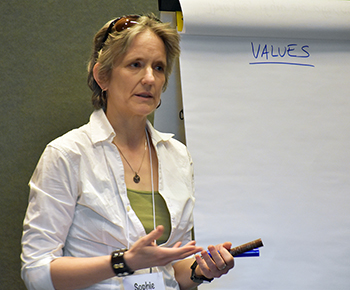| Search PNC News for stories of people and churches in our UCC Conference: |
|---|
Sophie Morse leads workshop on conflict resolution
Sophie Morse, a conflict resolution consultant and trainer who works with the Dispute Resolution Center of Kitsap County in Silverdale, led an Annual Meeting workshop in April at Yakima.
 |
Sophie Morse invites participants to share their ideas. |
She is a member in discernment with the PNC.
“Often we feel conflicts are you vs. me, win/lose, and we focus on past hurts,” she began.
“How do we get from there to where we want to be, to a place where we can figure out our relationships together?” she asked.
While the polarized society today makes it hard for people to think they can work things out, she reminded that it’s about fixing a problem. We need empathy for each other to talk through and work through problems.”
In workshops, she offers tools, a road map to help people progress in relationships. It includes the following elements:
• Understanding conflict theory,
• Understanding ourselves,
• Active listening to understand,
• Asking for what we need and
• Negotiating (which includes several of the above steps).
“Matthew 5:23-24 says that if we offer a gift and remember our brother or sister has something against us, we need to go, leave the gift and be reconciled,” she said.
Sophie suggested listening to each other’s needs in small groups and led opportunities to practice active listening.
Participants shared what makes them feel they are in a safe place. Ideas included: be brief, let go of the past, no judging, be curious, no interrupting, be present, be respectful, speak for ourselves, no shoulds, be open to new ways to see things, humor, honesty and humility.
“In these times of change, conflicts arise,” Sophie said. “If we are in conflict with someone, active listening can de-escalate, because to be heard is rare and healing.
“Active listening recognizes a person needs to feel heard and understood. It involves body language, eye contact a head nod,” she said. “It’s easier to converse and be present for people we know and love.”
Active listening involves asking open-ended questions that invite people to share and invite feedback for future understanding.
“Three major categories to consider are facts, feelings, underlying needs or values,” she said. “It’s a gift to help name underlying needs. That gives a sense of belonging, and it relates emotions and needs.
“We need to listen not just with our heads but with our hearts,” she said, “so we understand the underlying need. We may ask if the person feels overwhelmed, or use a statement form of feedback that invites a person to share more.”
For information, call 360-870-8024 or email sfmor1@gmail.com.
Copyright © September 2018
